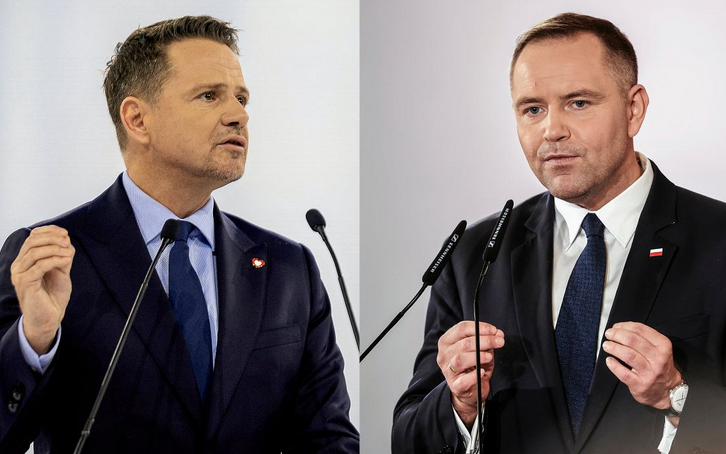Polls for Poland’s presidential election this spring have narrowed significantly in recent weeks, with front-runner Rafał Trzaskowski of Prime Minister Donald Tusk’s Civic Coalition seeing his lead over conservative candidate Karol Nawrocki, cut in half to 7.2 percentage points.
The growing influence of right-wing Confederation candidate Sławomir Mentzen, whose appeal to nationalist, anti-immigration, and conservative Christian values, is reshaping the campaign’s focus.
According to the latest Opinia24 survey, both main candidates have seen a drop in support since December, with Trzaskowski, the current mayor of Warsaw, falling considerably from 38.6 percent to 29.8 percent. Meanwhile, Nawrocki has experienced a modest 0.6-point decline to 23.2 percent.
One benefactor has been Mentzen, whose support has climbed to 13.2 percent in the most recent poll — up from 10.7 percent last month — and candidates attuned to the political climate are reinventing themselves to appeal to the Confederation candidate’s core support base which could prove pivotal in a potential second-round run-off.
Błażej Spychalski, an advisor to outgoing President Andrzej Duda, believes the election will hinge on which major candidate can secure the votes of Mentzen’s base.
“The person who convinces the voters of Sławomir Mentzen will win,” Spychalski stated in an interview with Interia Wydarzenia, noting that the campaign has already begun leaning to the right on issues such as immigration, national sovereignty, and Christian values to attract this decisive bloc.
“This is why Trzaskowski is already trying to present him as a politician who refers to national issues, security, family, and even the Catholic faith. These are things with which Rafał Trzaskowski objectively did not have much in common for many years and which were somewhere on the margin of his public activity. At the same time, the PiS staff will do everything in the coming months to prove that the new image of Rafał Trzaskowski is false,” explained Spychalski.
“His statements and actions from recent years, as well as how he walked with a rainbow flag at equality parades, will be recalled. The question, of course, is which of the teams will be more effective in telling the story about their candidate.”
Mentzen’s unwavering authenticity and consistent long-term views on issues such as economic policy, the Covid-19 pandemic, and Ukrainian skepticism, while unpalatable to some, will prove to be an attractive trait for a key section of the electorate.
“Mentzen has been saying the same thing for years, whether popular or not — that credibility is a critical asset in today’s political climate,” Spychalski added, predicting Mentzen will secure a strong third-place finish, potentially drawing votes away from both Trzaskowski and Nawrocki.
The current president’s advisor also credited Mentzen’s hard work, citing his campaign’s extensive outreach, with meetings in 42 towns scheduled this month alone, as a key factor in his growing appeal.
Turnout in the first round is projected at 67 percent, with a significant portion of undecided voters — particularly women — expected to play a critical role in determining the outcome. The current number also shows considerable scope to attract apathetic voters ahead of the first round on May 18.
If no candidate wins outright, a runoff between Trzaskowski and Nawrocki on June 1 appears likely. Current polling suggests Trzaskowski would lead with 47.9 percent to Nawrocki’s 38.7 percent, leaving a potentially decisive 13.3 percent undecided.






